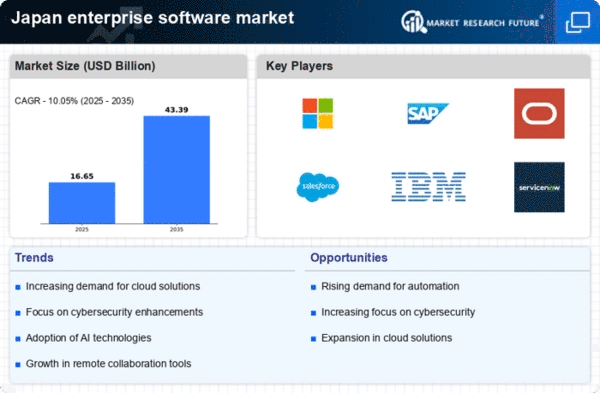Remote Work Trends
The shift towards remote work in Japan is reshaping the enterprise software market. As organizations adapt to flexible work arrangements, there is a growing need for software that supports collaboration, communication, and project management. Recent surveys indicate that over 60% of Japanese firms are implementing remote work policies, which necessitate robust enterprise software solutions. This trend is likely to drive demand for cloud-based applications that facilitate seamless connectivity and productivity among remote teams. Consequently, the enterprise software market is poised for growth as companies seek to invest in tools that enhance remote work capabilities.
Focus on Data Analytics
The increasing emphasis on data analytics is a key driver of the enterprise software market in Japan. Organizations are recognizing the value of data-driven decision-making and are investing in software that provides advanced analytics capabilities. Reports suggest that the analytics software segment is expected to grow by approximately 20% in the coming years. This growth is fueled by the need for businesses to derive actionable insights from vast amounts of data, thereby enhancing operational efficiency and strategic planning. As companies strive to leverage data for competitive advantage, the enterprise software market is likely to expand in response to this demand.
Integration of IoT Technologies
The integration of Internet of Things (IoT) technologies is emerging as a significant driver for the enterprise software market in Japan. As industries increasingly adopt IoT solutions, there is a corresponding need for software that can manage and analyze the data generated by connected devices. The market for IoT-enabled enterprise software is projected to grow substantially, with estimates indicating a potential increase of 25% over the next few years. This trend reflects the growing recognition of IoT's potential to enhance operational efficiency and create new business models. Consequently, the enterprise software market is likely to benefit from the rising demand for solutions that facilitate IoT integration.
Digital Transformation Initiatives
The enterprise software market in Japan is experiencing a surge due to ongoing digital transformation initiatives across various sectors. Organizations are increasingly investing in software solutions to enhance operational efficiency and customer engagement. According to recent data, approximately 70% of Japanese companies have initiated digital transformation projects, which often necessitate the adoption of advanced enterprise software. This trend is driven by the need to streamline processes, improve data analytics capabilities, and foster innovation. As businesses seek to remain competitive in a rapidly evolving landscape, the demand for enterprise software solutions that facilitate these transformations is likely to grow, thereby propelling the market forward.
Regulatory Compliance Requirements
In Japan, stringent regulatory compliance requirements are significantly influencing the enterprise software market. Companies are compelled to adopt software solutions that ensure adherence to various laws and regulations, including data protection and financial reporting standards. The market for compliance-related software is projected to expand, with estimates suggesting a growth rate of around 15% annually. This demand is driven by the increasing complexity of regulations and the potential penalties for non-compliance. As organizations prioritize risk management and compliance, the enterprise software market is expected to see a corresponding rise in solutions tailored to meet these needs.
















